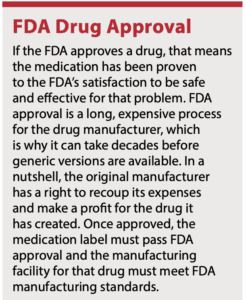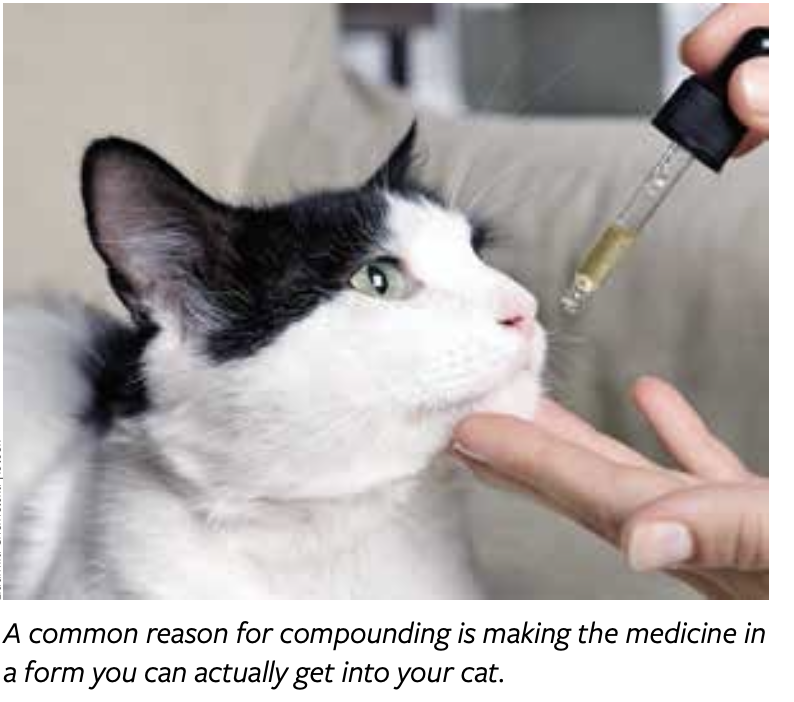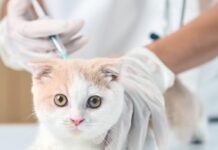FDA Drug Approval
If the FDA approves a drug, that means the medication has been proven to the FDA’s satisfaction to be safe and effective for that problem. FDA approval is a long, expensive process for the drug manufacturer, which is why it can take decades before generic versions are available. In a nutshell, the original manufacturer has a right to recoup its expenses and make a profit for the drug it has created. Once approved, the medication label must pass FDA approval and the manufacturing facility for that drug must meet FDA manufacturing standards.
C
ompounded drugs are medications manufactured in a different strength, form, or flavor than the FDA-approved version of the same drug. As of this year, the FDA is limiting compounded medications to those prescribed for one specific patient. In other words, a veterinary clinic can no longer have compounded medications in stock and ready to hand out; they must write a prescription. While the veterinarian will generally recommend a compounding pharmacy, the responsibility of keeping up with medication orders now falls squarely on the cat owner.
Compounded drugs are not FDA-approved, but they are usually based on FDA-approved medications. The FDA does not evaluate compounded drugs for safety or efficacy, but allows veterinarians to use their discretion in prescribing them, provided that no FDA-approved medication is available to treat the specific condition diagnosed in a particular animal.
Compounded drugs and off-label drugs are not the same. Off-label drugs are FDA-approved for a specific purpose, but the experience of other veterinarians suggests that the medication is safe and efficacious for a condition other than the one for which the FDA approved the drug so veterinarians prescribe it.
Generic drugs also are not compounded drugs. Generic drugs have the same medication and dosage as their brand-name counterparts, although inactive ingredients may vary. Companies that manufacture generic drugs are monitored by the FDA.
Reasons for Compounding
The most common requests received by a compounding pharmacy include:
Making an oral suspension from crushed pills
Adding flavor to a medication
Mixing multiple solutions into one medication
Reformulating the medication as a transdermal product that will be absorbed through the skin
Repacking the medication into a capsule or a chew
Changing the concentration (dosage) if there is no FDA-approved version for a pet’s size
What Qualifies for Compounding
For a veterinarian to prescribe a compounded medication, a cat must be under the care of the veterinarian with a valid client-veterinarian relationship. Your cat must have a medical problem that requires treatment with the drug in question. Your veterinarian must also believe that a compounded version of the medication is in the best interest of your individual cat.
 A common example is a cat diagnosed with hyperthyroidism and being treated with methimazole, which is usually provided as a pill. While there are cats who are OK with being pilled daily, for most cats and their owners it is stressful—and stress is something to avoid in cats that are ill. In this case, a compounded transdermal gel on the inside of the ear can be the answer. Not all drugs can be absorbed this way, but it is a great option for those that can be.
A common example is a cat diagnosed with hyperthyroidism and being treated with methimazole, which is usually provided as a pill. While there are cats who are OK with being pilled daily, for most cats and their owners it is stressful—and stress is something to avoid in cats that are ill. In this case, a compounded transdermal gel on the inside of the ear can be the answer. Not all drugs can be absorbed this way, but it is a great option for those that can be.
Finding a Reputable Company
If a compounded medication is chosen for your cat, your veterinarian will guide you to a reputable company. The Pharmacy Compounding Accreditation Board, which is part of The Accreditation Commission for Health Care, accredits compounding pharmacies. If possible, choose a company with pharmacists accredited with the American College of Veterinary Pharmacists.
Be sure the company normally does veterinary prescriptions. Once your prescription is submitted, the medication will generally be shipped directly to you, although sometimes it comes to the veterinary clinic.
Bottom Line
The 2023 FDA rule change about compounding only for individual pets means that your veterinary clinic cannot keep a compounded drug on hand for easy dispensing. What this means to you is that you must keep up on your cat’s drug supply so you can get a new prescription and order your meds ahead of time, before you run out.
Compounding can be a lifesaver for a difficult-to-medicate cat, especially if she has a chronic condition that requires lifelong treatment. Be smart and work through the compounding pharmacy that your veterinarian recommends.




